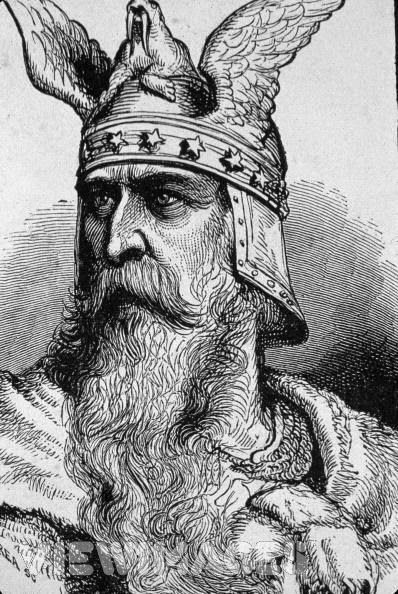... And I quote, Gyarn, "are religious war and exploration the ugly stepchildren of the Renaissance?"
As we all know, the three intellectual hallmarks of the Renaissance are humanism, secularism, and individualism. As these ideas began to infiltrate society, people began to think differently, and to think more. With the new ideas and new things created in the Renaissance came the desire for new ideas and new things even after the age technically ended. The Renaissance mentality (that is focusing on the strengths and development of the individual along with the important matters of life such as education and art, aside from religion) led to the desire to push the limits and constantly know and do more - people got to thinking, and so they got to doing.
(This guy was a thinker too)
Thus, the era of exploration. During this era, explorers all over the place were finding new routes to places and making settlements and whatnot. Motives for exploration were varied -- for some, finding new routes meant easier access to trade and thus economic success (for example, Vasco da Gama's newfound sea-route around Africa to India and the spice islands). For others, the thought of precious metals, and eventually new crops, and the riches that followed their discovery and cultivation was irresistible (settlements in the New World). So yes, man is selfish -- but who doesn't want money? If it wasn't for the Renaissance mentality of wanting to know and do more, Europe might have been swept by laziness rather than the itching for exploration.
(Routes of Columbus, Magellan, Da Gama)
Accompanying this era of exploration is an era of religious war. After Luther's 95 Theses, the Reformation, the Counter-Reformation, etc., there is still a great deal of religious unrest in Europe. France and the Netherlands were a wreck with the Catholic vs. Protestant vs. Calvinist issues. Of course, power struggle is an issue here. The Renaissance mentality allowed the individual to think freely and decide what is right for him, rather than simply submit to society and go about one's own business disregarding independent ideology. So, as all these new religions were growing, and these political states were changing, a breeding ground was created for religious war.
Some connection of religion and expansion is explained in a quote on page 507 in the textbook (props to Nicole for pointing this out): "Religion supplies the pretext and gold the motive." In regards to exploration and settlement of the new world, this is exceedingly true. Explorers, predominantly the Spanish, went over to the New World hungry for wealth. Yet, they wore a mask of good intention in acting as Christian missionaries to convert the pagan natives.
(Missionaries with Natives)
We must ask, however, how truly good these intentions were. Explorers like Columbus enslaved the native population of the Americas, forced them to convert to Christianity, introduced them to deadly European diseases, and killed off the majority of them. While these "missionaries" thought they were doing good Christian works by converting the pagans, they were not even being humane, much less Christian in ethics. They destroyed a native population, in order to get richer (precious metals!), in the name of Christianity.
(Native American slavery)
Last but not least, Columbus. Do we like him? Should we really be celebrating Leif Erikson in mid-October, who stumbled upon America and didn't wipe out millions of native people? Columbus was cruel and selfish, enslaving natives for work that would only benefit people back in Europe. He had knowledge of the sea (he was indeed a skillful sailor), but he did not necessarily have worldly knowledge. Columbus explored for selfish reasons (money and power) versus pure intellectual curiosity, the desire to know, putting shame to my prior idea, that the Renaissance-born thirst for knowledge established the age of exploration.
(I mean, look at these two. Leif Erikson looks pretty cool and very tough. We should totally celebrate him)






No comments:
Post a Comment